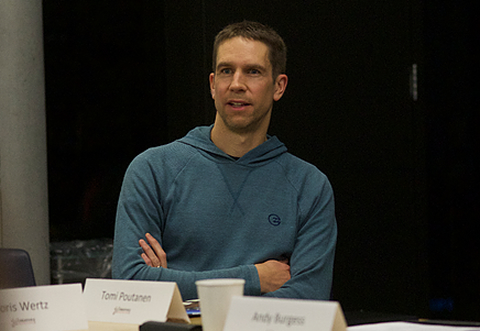When you buy a book or a CD at an online store such as Amazon or Indigo, the retailer typically makes suggestions about other products you might like. These now ubiquitous “recommendation” features draw heavily on your past buying patterns – and other consumers’ purchases – to come up with suggestions.
But as Tomi Poutanen (MASc 1998, MBA 1999), an entrepreneur and artificial intelligence (AI) innovator, points out, the software making these recommendations is limited because it draws on a relatively narrow base of past sales information. The technology could be enriched, he says, by incorporating all sorts of other data that companies collect about consumers and the products they choose. He asked himself: What would happen if recommendation software more closely mimicked the way our brains function when we make choices about what we’d prefer to buy or see next?
Poutanen, who coaches machine-learning entrepreneurs at the Rotman School’s Creative Destruction Lab, is attempting to answer that question with the launch, this fall, of Layer 6 AI. The company’s software draws on insights about how the human brain functions and the “deep learning” technology pioneered by U of T computer scientist Geoff Hinton to make better recommendations – as much as 50 per cent better, the company claims. (“Layer 6” refers to the arrangement of neurons in the brain’s neocortex region, which is responsible for learning and cognition.)
The company’s software relies on a much wider range of user data than existing systems, Poutanen says. In the case of a music-streaming site such as Spotify, Layer 6 AI might factor in information such as a song’s acoustical patterns, the year it was released or its position on the Billboard charts when making recommendations to a subscriber.
Dating sites using the company’s technology might offer matches based not just on members’ personal information but also analysis of facial features or clothing choices in profile photos. Pilot projects with firms providing video on demand and financial services are under way. “Our system,” Poutanen says, “allows a company to leverage all the data they have and takes the context into account.”
Poutanen, who earned his master’s in computer engineering at U of T, is a serial entrepreneur who says he’s still learning from the other coaches at the Creative Destruction Lab, as well as the teams he’s mentoring. “I draw inspiration from the determination, optimism and ambition of the ventures,” he says. “The advice and learned wisdom that’s shared makes me a better operator of my own startup.”
Poutanen has built three previous software firms specializing in data compression, web search and social networks geared at users looking to connect with people with shared cultural or musical interests. At his third company, Milq, he and his team developed what he describes as one of the first true deep-learning recommendation systems, which he spun off earlier this year to form Layer 6 AI.
He will be presenting Layer 6 AI’s system at “Machine Learning and the Market for Intelligence,” a conference today at U of T’s Rotman School.
Recent Posts
People Worry That AI Will Replace Workers. But It Could Make Some More Productive
These scholars say artificial intelligence could help reduce income inequality
A Sentinel for Global Health
AI is promising a better – and faster – way to monitor the world for emerging medical threats
The Age of Deception
AI is generating a disinformation arms race. The window to stop it may be closing





